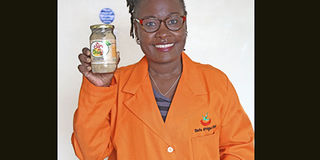Kenya’s own spice girl

Anzazi Kiti, 29, had a childhood passion for cooking that led to a business making spices – that was almost interrupted by a short stint in auditing. PHOTO| FILE| NATION MEDIA GROUP
What you need to know:
- Anzazi Kiti, 29, had a childhood passion for cooking that led to a business making spices – that was almost interrupted by a short stint in auditing.
“In high school, I began making my own food seasoning. Boarding school food wasn’t good food. I remember thinking when I first tasted it, ‘This food is not yummy like Mummy’s food’. I made the seasoning at home using whichever ingredients were available in our kitchen – onions, dania, tomatoes, garlic, ginger, cumin, pepper, red pilipili; pretty much what we still use in Chibundiro, although now they’re to standard measures. The seasoning is ready eat. It can also be used in the final stages of cooking, or as a marinade, garnish, topping or in curries. I’d sprinkle it on my plate.
“I grew up in Bamburi, Mombasa. ‘Chibundiro’ is a word from my Chonyi mother tongue, it means ‘mortar and pestle’. My love for cooking is from my mum. She’s a wonderful cook. I’m the second in a family of six so she taught me a lot while I helped her in the kitchen as a child. I also liked to make my own little jiko and sufurias from old tins, and my mother would give me some food to cook.
“Aside from the seasoning, I also sold biscuits to my schoolmates for pocket money, and bought my own camera to become a photographer. Sometimes I’d send some money home, sometimes to my siblings in school.
DAUNTING
“I went to Kenyatta University in 2010 for my first degree in economics and finance. It was daunting coming to live in Nairobi because I’d not been here before. I had a great time in school, even went into campus politics in my second year. My campaign slogan was, ‘Kiti apewe kiti’. I was elected as congress lady to the student’s association and in my third year, as vice president. I went into politics because I wanted to make sure we – the students – wouldn’t strike and disrupt learning. Well, we didn’t.
“My business took shape in my final year, when a non-profit asked students in my campus to pitch business ideas and mine was selected. I was given Sh4,800. I used it to buy plastic jars from Industrial Area and ingredients from Githurai market. I cooked in my hostel room. I’ll never forget the feeling of accomplishment when the plastic jars of my seasoning were lined up on the exhibition table. I was elated but still lacked confidence in myself.
“I got a job with one of the ‘Big Four’ audit firms before I graduated. I was in forensic auditing and investigation. I reported on March 1, 2013. I travelled around Kenya and Africa a lot, even to Europe a couple of times. I was always aware that being employed was an opportunity for my hands-on growth, so I made a deliberate effort to rotate departments from tax to restructure, and learn as much as I could.
“Chibundiro was my side job then. I was blessed to get a boss who’d give me leeway to attend to it when it asked of me. I rented a small room where I lived and hired someone to cut and prepare the ingredients during the day. I’d cook and package them in the evening for delivery the next day. A majority of our orders were from our Facebook page. We were making about 10 standard jars a day – hot chilli, mild chilli and no chilli. “I could balance audit work and Chibundiro, but I knew in my heart I wouldn’t be in employment for long – I was giving more than 10 hours a day to my employer and two hours to Chibundiro; my vision for Chibundiro would only be realised if I’d give it more time.
“In early 2016, I left to become a senior consultant with another audit firm. We were making 40 jars a day by then, then by 2017, 80 jars. In early 2018, 400 jars. Now we make 1,000 jars a day for retail and export.
“Anyway, in 2016, when I was in the second audit firm, Chibundiro started getting in the way of work and the relationship with my boss. It was time to jump ship. I left for Christmas that December and didn’t return in the New Year.
NOT SUSTAINABLE
“All along, we’d been selling made-to-order jars to referrals and through our Facebook page. It wasn’t a sustainable business model. I approached supermarkets to stock us. The negotiations were lengthy and quite tasking, but in 2017 we were in Chandarana supermarkets. We’ve gotten into five other chains since and two months ago, into Naivas supermarkets. Retailing pushes large volumes but it affects our cash flows because some pay after 45 days, others 60.
“Retailing also meant scaling up production. We’d been doing everything by hand since we began – scrubbing carrots, tearing dania, crushing garlic, blending them to pulp. Three machines I’d imported from China arrived recently. The machines will cut our production time and increase output. I got an interest-free loan from a non-profit to finance the machines.
The team has 12 permanent employees, two admins, three casuals and 70 independent distributors. “We launched a new product range last July – ‘Siri ya chai’, ‘Siri ya pilau’ and ‘Siri ya utamu’. I’m aligning Chibundiro to be the leading all-natural seasoning in all households in Kenya.”




